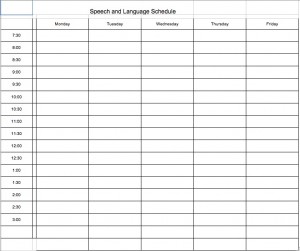SLP Chat
This will be a place where therapists can share ideas, problem solve and express concerns. Lets work together to make our jobs easier!
Teresa
Survey: Speech and Language Evaluation Process
During the month of October the bulk of The School Speech Therapists articles are going to focus on the speech and language evaluation process. I know what works for me but there is always room for change and imporvement. I’d love input from other school speech language pathologists. Please take the time to fill out the survey below. Feel free to add any comments or suggestions for articles. Press “next” to proceed to survey.
This survey is currently disabled.
The School Speech Therapist Book Review
The Death and Life of the Great American School System
Book Review
I’m almost finished listening to the book The Death and Life of the Great American School System by Diane Ravitch. All I can say is no wonder the United States finds it’s self in a quandary about what to do to improve all schools. Ms. Ravitch is an Educational Historian who speaks from experience, significant research and some first hand observation. Her book goes back several decades and chronicles the many many attempts to improve schools. It is amazing how many methods have been tried and I might add failed. Reformers, educators (those involved in school reform), administrators and even statisticians have made education so complicated and convoluted over the years it’s no wonder that most reform attempts fail.
While reading this book I get the sense that most reformers have no understanding of children, how they learn, how challenging other aspects of their lives can be or even human nature. Most reform measures seem very myopic in their goals and never look down the road as to the child’s ability to apply learning to life. Reform ideas seem to appear willy nilly without research, studies, development or revision. If a reform idea doesn’t work after awhile one of two things seem to happen, they move on to another reform or the players move on and the original reform fades away. I’ve actually worked in districts who have jumped from reform idea to reform idea. What I noticed in these schools are students with glaring splinter skills and a general lack of maturity in their academic abilities and confidence.
What is most interesting about this book is that Ms. Ravitch was originally a supporter of reform until she realized most of reforms didn’t worked, reform promoted cheating, the goals set were impossible and that state mandated testing produced little reliable data. Ms. Ravitch, also points out that much of the blame, when reforms fail to produce improved test scores falls on to the teachers and principals. She sites several reasons why the sole blame should not fall on teachers and principals alone. My impression is that school reformers claim to fame is to place the blame on teachers and unions when their ideas don’t work. I found it very curious that even most recent reform ideas don’t seem to mention much about developing a good strong curriculum for teachers to work from. I would think that would be the biggest part of the whole equation.
This is a long complicated book and much of the time the information just blended together. This isn’t to fault Ms. Ravitch’s writing, it just emphasizes how disorganized school reform is. Her book makes hundreds of valid points around the mistakes made in reforming education. It is a fabulous book for discussion points. The Death and Life of the American School System details the history of education across the nation not just what has happened in your school district or state. I think most readers will be surprised at some of the absurd situations and ideas that have developed over the years in education. There also appears to be a general lack of ownership and clear documentation when reform ideas fail.
Teacher’s are almost powerless in fighting school reform and their opinions and experience is rarely (if ever) solicited. For years, I’ve wondered why school administrators, superintendents and even school boards don’t question reforms being forced on school systems. Especially systems that have high functioning schools. Struggling schools tend to go through these reform programs quickly, dumping them when they can’t report an immediate success rather than tweaking them to fit their needs. Frequently, I see and hear about school districts spinning what they know are going to be ineffective approaches, to parents and the media, always touting that they’re implementing the next great thing in education.
Everyone wants to see the data. Ms. Ravitch points out that data doesn’t show everything and that often the wrong data is collected and compared. I know that there have been programs introduced in schools that have been widely used for years. I’ve asked the consultants of these programs to show me the data and they usually can’t. I believe it’s because there isn’t any. Yet when presenting to a group, consultants will always say, “The data shows….” I learned a long time ago, from one of my grad school professors in fact, to question educational data.
So pick up this book read, listen and highlight. Learning the history of reform, lack of organization and lack of success made me realize that I am not the only one who is concerned that education has taken a wrong turn. This book should be required reading for every school committee member, administrator, superintendent, mayor, town counsel, finance committees and anyone else who has responsibility for planning children’s education.
Numbers vs. Need
Kudos to anyone who has a working schedule in place. Now the question is can your schedule be implemented with quality and consistency. Talking with colleagues in several states, I noted for some, caseload management is a huge issue. Almost all full time therapists have big numbers. Many report 60 to 90 students on a caseload. Some of these therapists have speech language assistants and some don’t. A good assistant can be somewhat helpful but the ultimate responsibility for the student’s programming falls on the therapists shoulders.
Over the years I’ve been lucky to work on occasion with principals, team leaders and even special education directors who for the most part were aware of caseload numbers and sometimes understood need differences. I’ve learned over the years to advocate for myself in terms of the time needed to adequately service my caseload. Sometimes the administration listened and sometimes there was no money to listen.
When assessing the needs of any special needs caseload wether it be the special education teachers caseload, the speech therapists caseload, the school psychologist caseload, the team facilitator’s caseload and even classroom placement, the students needs not just the number of students needs to be looked at. As speech therapists, we know that 60 students with developmental articulation needs is a lot easier to manage than 60 language learning disabled kids. Our caseloads are never that straight forward either. Within a group of 60 students, a typical speech language pathologist will service a variety of disabilities ranging from simple articulation errors, to language learning disabled, to low cognitive, to specific disabilities such as Aspergers and autism, to physical disabilities effecting communication and everything in between.
If a therapist has 60 students on a caseload they might miss 60-180 hours of therapy just attending annual meetings. Thats 10-20 days of therapy and at least 6 meetings a month. We can write IEP’s that involve articulation and development language delay in our sleep but children who have more complex needs, their IEP’s require more time and thought. At least a fourth if not more of the students on the caseload will require a 3 year re-evaluation. Comprehensive speech and language evaluations take anywhere from 6-12 hours to complete dependent on the students needs and if you include write up time. That’s another 90 hours or 15 days of therapy. it is almost impossible to build in time for meetings and testing when caseload numbers are big. My point is the larger the caseload numbers the more therapy will be cancelled due to other tasks because most of those tasks have to meet mandated deadlines. If the student is a more involved student all those housekeeping tasks take more time too.
Administrators, please look at caseload need when determining how many therapists you need to service your school or district. Ask your therapists what their caseload needs are not just how many students they have. Look at the schedule and see if it is even physically possible to schedule students and allow for adequate meeting and paperwork time. If a school schedule does not accommodate special education students and their needs it is your responsibility to initiate change. Speech therapists often need more paperwork time because almost every student we see has unique and significant needs. Canceling therapy is unacceptable as a solution.
Parents, at your team meeting, ask outright how many students there are on the therapists caseload. Parents don’t hesitate to question class size and caseload size is no different. If you don’t like hearing that the therapist has to service over 60 students in a week. question them as to how the therapist will manage to give your child what they need.
Therapists, advocate for yourself and speak up. If your caseload so challenging, numbers are too high and need is too great, that the children are not getting what they need and you have to cancel therapy on a regular basis, your caseload is too difficult to manage. You are not a failure if you have impossible parameters to work with. Make a list of the issues and present it to your principal, special education director and team facilitator. If you don’t educate them on caseload needs they will never understand. Even if it doesn’t help your immediate situation it may change they way they look at things in the future. Point out that an assistant is not always the answer since you have to supervise them and most are not qualified to work with more involved students.
Not all caseloads are created equal. Therapists and teachers know this. Caseload management is an issue that is talked about a lot among therapists and teachers. We know the problems but nothing will be done about it until we are able to educate our administrators on need vs. numbers.
Carly’s Voice: Breaking Through Autism
A cousin of mine who happens to have a grandson with autism mentioned this segment that aired on “The Doctors” today. I found it extremely interesting from a speech and language perspective . Also interesting from a life perspective. Take the time to watch the videos, very enlightening. I sometimes put down technology when it comes to developing language but in this case technology gave Carly Fleischmann a way to have a voice in the world.
Carly’s Fleischmann on the Doctors
I’m planning to read (listen) to her and her Dad’s book soon.
Share Your S.M.A.R.T. Professional Development Goals
I’ve had a few therapists ask me about writing S.M.A.R.T. professional development goals. I can find some examples for teachers, information on “how” to write them and even a few templates. However, there isn’t much out there for speech language pathologists to reference. After a quick search I found no examples specifically for SLP’s.
Has anyone recently completed their professional development goals? If you have, share your work. Basically we all work on similar things and with similar students. As a profession our goals should reflect our uniqueness and not be the same as teacher goals. We’re bright people and can figure out how to write a goal but why reinvent the wheel. Not that personal goals should all be the same but you may have though of a particular goal that is extremely appropriate but not typical.
Please share your thoughts and process around creating your S.M.A.R.T. professional development goals. Leave a few examples or other resources. We’re in this together and you’ll be appreciated more than you know.
Proactive Scheduling
In over 25 years of scheduling speech and language students only ONE year did I work with an administrator who had the foresight to create a schedule for our special needs students before the end of the previous school year. You might ask why I am writing about this in September. Well, it takes pre-planning and scheduling insight to get to the point where scheduling in June for the following September can actually be done.
Three factors happened that actually made this scheduling process possible.
- The overall school schedule was remaining consistent the next year. My recent experience tells me this doesn’t happen too often. Having a consistent schedule year after year is actually a positive universal support and something schools should strive for.
- Staffing was remaining the same in terms of the positions not necessarily the people.
- We had the time to do it. Because of this particular program manager/team facilitator (whatever they’re called in your district) common sense, we were finished with our re-evals and all IEP meetings 3 weeks before school ended. Not only did we have the time to see students up until the last week of school we had time to finish our progress reports and plan for the following school year. It was an amazingly calm end to the school year. Re-evals and IEP meetings can always be moved up. There will always be unknown factors like a last minute referral or an IEP that needs to be redrafted. But it is possible to avoid the stressful end of year crunch with a little foresight and effort.
This is how the scheduling process worked.
- The entire team which included the special education teacher for each grade, the school psychologist an the speech language pathologist met without reservation. We were excited to work on this. Our highly organized program manager arrived with copies of all the information we needed and a process in mind.
- Using a computer overhead with a template on a white board (we were 3 months away from smart board technology in our school, image how that might have sped up the process) we look at individual grade schedules (we were scheduling 3 middle school grades). To this schools credit, they provided a one hour “study hall” block, for each grade at different times, in which many activities took place for both regular and special education students.
- We looked at specialists schedules. We considered all aspects of individual schedules such as specialists that were only in certain days of the week or had other specific commitments in schools such as working in the classrooms. Our administrator was also aware of other factors such as planning time, lunch and meeting time.
- We scheduled students that had limited flexibility or high frequency of services first. Lower functioning students who spend time in a separate program usually have more flexibility in the schedule than the typical language learning disabled student who follows the general classroom and school schedule.
- We filled in blocks, erased, shuffled but finally came up with a schedules that looked like they might work. Having more than one set of eyes on the scheduling process helped to find and resolve conflicts easily. We of course took notes comparing and double checking along the way.
- Our program manager took the responsibility of putting final information into the computer and distributing schedules.
Because of this administrator’s vision, effort, intelligence, commonsense and actually taking charge, we were able to start seeing students the first week of school the following September. I know it took our administrator a year or so to push up and space out the IEP meetings so we could have a relaxing end to our year. I thanked her for that. Not having to deal with scheduling in the fall was well worth the minimal time and effort spent in June. I thanked her for that too.
I couldn’t pass this one up. Even the students who speak well are often misunderstood at school. Imagine what our students could learn sitting next to a friendly social talker.
(Sorry I can’t figure out how to delete the picture so you are seeing double. I tried)
Having trouble getting your schedule to work?
It’s inevitable, the school speech language pathologist will have difficulty putting together a workable schedule. Some years it’s just more difficulty than others. We all know the obstacles we face (15 scheduling obstacles). I have a simple tip for those of you who feel completely overwhelmed. Ask for help.
One year I was working in 2 buildings and wasn’t very familiar with the overall school culture. We were packing 20 kids into 19.5 hours (I realize that is a luxury to some of you). The schedules were extremely different but most core classes were taught in the morning. It didn’t take me long to realize I didn’t want to waste extreme amounts of time and energy needed to create, recreate and then revamp a schedule that probably couldn’t work. In the mean time students were losing precious services.
I asked the program mangers in both buildings to sit down with me and help work out a schedule. I explained the issues I was dealing with and that I was not able to solve the problem on my own. When they arrived I was prepared with copies of schedules and templates in case they showed up empty handed.
We sat down for what they thought was going to be about a half hour and it took almost two hours to work then rework my schedule. In the end I had a schedule I could implement the next morning. One set of eyes wasn’t enough and I couldn’t identify all the conflicts not knowing the schools various routines and culture.
Did I feel like I couldn’t do my job on my own? No I also realized I was given almost impossible and unknown parameters to work with. Did it speed the process along? Sure did. Did it save grief and strife? Yes again. Did my program managers gain insight and understanding of the challenges I was facing? Not sure about that but I like to think I at least planted a seed.
If you feel like you are facing significant difficulty putting a schedule together either because of your numbers, severity of caseload or too many schedules to combine, ask for and if necessary insist on help. It’s the right thing to do. An extra set of eyes can never hurt. Your stress level will thank you.
Scheduling: School Speech Therapists Are the Experts
 The beginning of the school year is always filled with excitement, anticipation and hope. It is rather nice to have a job the starts “fresh” every year. Schools look polished, organized and clutter free. The kids look happy, enthusiastic and clean. However, for therapists this feeling of euphoria is always short lived. First we see our numbers and our caseload. Usually we can deal with that by slowly chanting “it is what it is, it is what it is”. We start thinking of therapy ideas the minute we know who are students are. That’s truly one of the fun parts of the job.
The beginning of the school year is always filled with excitement, anticipation and hope. It is rather nice to have a job the starts “fresh” every year. Schools look polished, organized and clutter free. The kids look happy, enthusiastic and clean. However, for therapists this feeling of euphoria is always short lived. First we see our numbers and our caseload. Usually we can deal with that by slowly chanting “it is what it is, it is what it is”. We start thinking of therapy ideas the minute we know who are students are. That’s truly one of the fun parts of the job.
Then comes the next step, da-da-da-dum………….working out a schedule. School Speech Language Pathologists are good at many things but we are experts in scheduling. There is no graduate course that prepares us for this task. They can’t teach a course on this because every school and every year the process is different. In fact, if they showed a scheduling process to speech language pathology graduate students most would choose to work somewhere other than a school. Scheduling for the Speech Language Pathologist is a self taught skill. It is also our most challenging task and the task that usually takes the longest.
A pallor actually falls over the room when we sit down to “work out” our schedule. Unless a therapist is extremely computer savvy, we sit with blank templates, a box of sharpened pencils and a large eraser. Depending on the school, we might be holding anywhere from 3-8 different schedules in our hands. We have to cross reference and cross check over and over again, shuffling 8×11 sheets of paper like they were playing cards. With any luck at all, the school has used colored paper to distinguish the different schedules but that’s a luxury afforded to only the most conscientious administrators (or their secretaries). Later on we acquire a clipboard and buzz around the school like bees going from flower to flower double checking everything, flipping through those schedules with speed and hopefully accuracy, making our first round of changes as we find conflicts.
How have School Speech Therapists developed such expertise in scheduling? Here are 15 obstacles the School Speech Therapists faces when scheduling. We work very stealth and few people realize or care about the challenges we face.
- We have to schedule anywhere from 30-80 students. First you have to figure out their needs, which students could possibly work together, which students can’t.
- Schools rarely keep a consistent or even similar schedule year after year so you have to get familiar with a new schedule.
- The school schedule itself may be a five, six or seven day rotation and you have an educational plan that says you have to see the student twice a week.
- The school schedule may “waterfall” meaning that the actually schedule will be different almost every day or every week. If you have to work in a “block schedule” format you might as well retire early.
- The administration when making the schedule gave no consideration to children who need to go out for services regular or special.
- Students in the same grade may not even be on the same schedule.
- If we have a place to work and service kids, it might only be available at certain times.
- We also may have to create a schedule for an assistant and find them a place to work.
- Team meetings and Special Education staff meetings are scheduled at the most inopportune times or worse yet randomly. You know students will miss services often if you put them in a particular slot but you have no choice.
- We often work in more than one building and have to accommodate each schedule.
- It’s actually worse when our buildings are on the same schedule.
- We only have certain days available in a building.
- We have to try and preserve some paperwork/prep time. (hahahahaha).
- Unless we are really pushy, we are usually the last ones to schedule. Not because we’re not on the ball or know what we’re doing, it’s because we’re the last ones considered.
- Then we have to go around to teachers and double check the times we selected. We have to play nice it sets the tone for the year. It’s almost like asking permission to see students we are legally bound to see.
Anyone who can coordinate this many factors and come up with a finish product deserves the title of “Expert”. Speech Language Pathologists would proudly accept the title of “Scheduling Expert.” However, there is little to no thanks for this skill. We accept the fact that it is a skill with only intrinsic value, we stay sane. Perhaps we should create a special certification for this skill. We could add Scheduling Expert to our title. It could look something like this MA/SLP-ccc SchEX. Anyone with at least 10 years experience school scheduling would be grandfathered in. We could even add it to our resumes. Imagine how good that would look.
Happy scheduling and good luck. I wish you a productive year with no mid year schedule change. May your evaluations be few and new students limited to 5.
Teresa Sadowski MA/SLP-ccc SchEX
Speech Language Pathologist
Scheduling Expert (25 years experience)
“Brain Training Programs” Any Experience?
Can anyone comment on their experience using brain training programs such as Fast ForWord, Lumosity, Attengo? I have a follower considering using this type of programming with her 8th grade son who has ADHD – inattentive type and difficulty with language comprehension. They would love to hear your experience, if you thought it made a difference, if it is appropriate for older middle school students and is it worth the cost? The student doesn’t qualify for services at school but has a 504 plan and could possibly use in-school time for this kind of training. Are these types of programs effective and what type of student generally benefits the most?
Thanks











